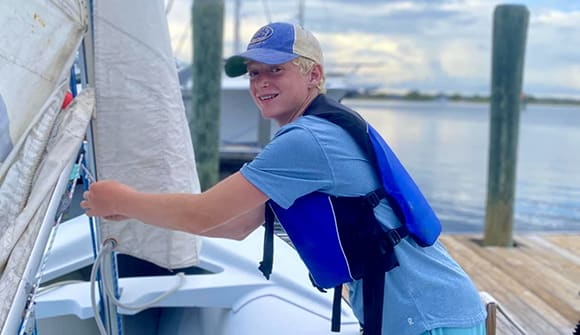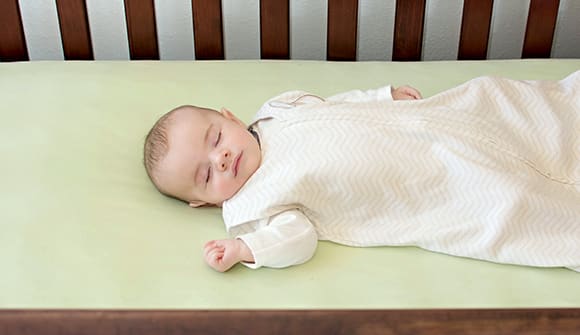Brain bleed sidelines teen athlete
South Georgia boy has surgery for ruptured brain arteriovenous malformation (AVM).
Article Author: Deborah Circelli
Article Date:

In the middle of what his mom describes as an eerie, foggy night, 14-year-old Colton Stengel was rushed by ambulance from South Georgia to Wolfson Children’s Hospital for a brain bleed.
His parents didn’t know if he’d survive and if he did, whether he’d be able to talk or walk. Their once-active son who plays ice hockey, football, wrestling and enjoys fishing was in a fight for his life.
Now, less than two months later, he’s back to taking some classes at school and working toward the activities he loves.
Active life takes drastic turn
The eighth-grader’s life took a turn during Spring Break on April 1, 2025, when he was at home in St. Marys, Georgia, with his parents and two siblings.
They had just returned from a camping trip when he started to get a terrible headache.
“I just remember we were doing a puzzle and the pain started slow,” Colton said. “My head was hurting a little then it just went off and really started to hurt a lot. It was really irritating. I was just trying to relax, and I couldn’t because it hurt so bad.”
His mom, Kellie, said she and Colton’s dad, Mick, thought maybe he was dehydrated from being in the sun or was having a migraine, which runs in the family. He took some medicine and also had some vomiting, but eventually fell asleep. Mick stayed with Colton, and at about 1 a.m. he realized his son was unresponsive and not waking. The parents called 911.
Colton was taken by ambulance to nearby Southeast Georgia Health System – Camden Campus, which has a relationship with Baptist Medical Center Jacksonville’s Stroke and Cerebrovascular Center, the region’s only Joint Commission-certified Comprehensive Stroke Center.
Brain bleed revealed
Scans revealed Colton had bleeding in his brain from a burst of an arteriovenous malformation (AVM), an abnormal tangle of arteries and veins. The blood vessels ruptured, causing a hemorrhagic stroke.
His parents were told he would be transferred to Baptist Jacksonville and Wolfson Children’s Hospital. Upon arrival, he was quickly taken into procedures to relieve pressure on his brain with the pediatric neurosurgery team led by Nathan Ranalli, MD, a pediatric neurosurgeon with the Walter and Michelle Stys Neuroscience Institute at Wolfson Children’s Hospital and the UF College of Medicine – Jacksonville.
“It was a pleasure to take care of Colton and his family. They deserve real credit for recognizing that he needed immediate attention, ultimately allowing us to intervene in a timely manner, first to relieve the life-threatening increased pressure on his brain caused by the bleed, and then to treat the AVM itself,” said Dr. Ranalli. “It requires the collaborative and multi-disciplinary approach we take here at Wolfson Children’s Hospital to achieve a truly successful outcome in a complex case like this one.”
Colton was then taken for an angiogram (scan of blood vessels) by Ricardo A. Hanel, MD, PhD, neurosurgeon and co-medical director of the Baptist Stroke & Cerebrovascular Center. Dr. Hanel also performed an AVM embolization (the insertion of material into the vessel to block blood flow) to prevent further bleeding and a craniotomy (open-skull brain surgery) to remove the two-inch clot together with the AVM.
“It’s a remarkable recovery,” Dr. Hanel said about Colton. “It’s a testament to the fast and high level of care he received. That helped him with his odds.”
Brain AVMs, which affect less than 1% of the population, are the most common cause of non-traumatic brain hemorrhage in children.
Colton’s mom remembered meeting Dr. Hanel before the surgery and feeling hope for the first time when he said, “I’m going to treat him like my own.”
‘They are my heroes’
Kellie teared up recalling when Dr. Hanel told her the six-hour surgery was a success.
“They are my heroes. It still makes me emotional,” she said about the teams and specifically Dr. Hanel. “He saved his life and we thank him, and forever will thank him.”
Dr. Hanel is grateful to the team and recalled the hug he received from Colton’s dad.
“I’m happy that our teamwork was able to help get Colton back,” Dr. Hanel said. “The hug I got from his father after I told him Colton would be OK and that the surgery went well is one of those moments I will carry with me for life. Being a father of three boys myself, I could easily relate to what he was feeling.”
Colton has recovered his speech and motor skills faster, thanks in large part to a stroke of luck: he’s left-handed.
"Some left-handed people are right-hemisphere dominant, which means their language function is harbored on the right hemisphere of the brain," Dr. Hanel said. "That’s probably why he recovered faster. If he were right-handed, he likely would have lots of issues with his speech."
For Colton, a large part of the 12 days in the hospital was a blur. But he, too, is thankful.
“I trust them. They know what they’re doing,” he said.
‘You are a miracle’
Colton’s mom continues to remind him how lucky he is.
“Every nurse who would come in to check on him would say, ‘you are a miracle,’’’ Kellie said.
Colton’s now in physical therapy twice a week for some weakness on his right side. Even though he was excused to do home schooling the rest of the year because of his high grades, he’s glad to be back in the classroom.
The teen, who enjoys math and hopes to one day be an engineer, told his mom he wanted to “feel normal again” and was worried about the number of school days missed in the hospital. Since returning, he’s already scored a 98 on a high school math test, making his family proud.
He hopes he can also return to his active lifestyle when he starts high school in the fall.
“I really do want to get back into playing sports. I enjoy them and thought they were a lot of fun,” he said.
His family is grateful the brain bleed didn’t happen during a game or when they lived in Kentucky, where they were farther from a hospital.
“I strongly believe this is the reason we are here near Jacksonville, so Dr. Hanel could save his life,” she added.
Her message to other parents is to trust their instincts if something out of the ordinary is happening with their children.
“It’s crazy how everything can change in a moment,” she said.
When a child is having a headache, it can be hard to distinguish if it's something more serious. Dr. Hanel said to be aware if a child doesn’t normally have headaches and is also experiencing symptoms like nausea and vomiting.
“Remember, a brain bleed can happen at any age,” Dr. Hanel said.
To learn more about Baptist Health’s Stroke & Cerebrovascular Center, visit baptistjax.com/stroke. For more information on pediatric neurology and neurosurgery, contact the Walter and Michelle Stys Neuroscience Institute at Wolfson Children’s Hospital at 904.697.3600 for neurology or 904.633.0780 for neurosurgery.



